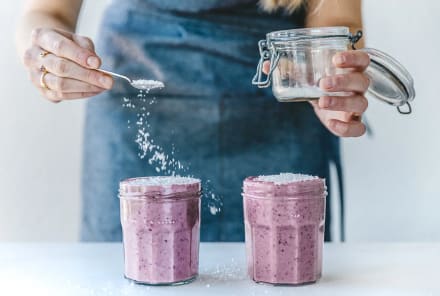Advertisement
10 Nutritious Low-Carb Recipe Ideas That Will Actually Fill You Up


Eating a low-carb breakfast used to be a trademark of the keto crowd, but it's quickly becoming more mainstream.
Some people find that limiting carbs during the first meal of the day helps them achieve their health goals—be it weight management, having more energy, having better blood sugar control, and more. While eating a low-carb breakfast may offer some benefits, R.D.s agree it could also present challenges.
Let's explore the pros and cons attached to low-carb breakfasts, along with creative recipe ideas to keep your palate intrigued and nutrition bases covered.
The need-to-knows:
- There's mixed research on whether low-carb breakfasts help with weight loss: New research finds that a more moderate carbohydrate approach can promote weight loss while protecting energy levels and satisfaction.
- Whole grains might be better: Instead of avoiding carbs at breakfast, focus on slower carbs (like whole grains) that deliver a gradual supply of energy to the body.
- Don't forget about protein and healthy fat: When building a satisfying breakfast with fewer carbs, be sure to add lean protein sources and healthy fats to round out your plate.
Why eat a low-carb breakfast?
Low-carb breakfasts are typically low in carbs and higher in protein and fat. Research and anecdotal evidence show they may be beneficial for:
- Weight management: "People often follow a low-carb diet to help with weight loss or weight management. They may also use a low-carb diet to control blood sugars, improve liver health when conditions like fatty liver are present, or to 'lean out and tone' muscles," Whitney Crouch, RDN, CLT, registered dietitian, explains. That said, as research evolves, we're finding that other strategies may be more effective for weight management. More on that below.
- Disease prevention: "There is also some evidence that the very low-carb keto diet may offer some benefits for people with epilepsy1, cancer prevention and treatment2, and brain health3," women's health and longevity expert Jen Scheinman, M.S., RDN, CDN, shares.
- Energy & appetite: "Some people following low-carb diets report that their appetite and energy levels are improved compared to higher-carb diets," Scheinman adds.
- Blood sugar control: Eating a low-carb breakfast may also help support healthy blood sugar 4among those with Type 2 diabetes. Other data shows that people with Type 2 diabetes who eat a low-carb breakfast versus a low-fat breakfast may reap blood sugar-management benefits5 as well.
As for how many carbs technically count as "low-carb," it depends on who you ask. These ballpark ranges6 can serve as a rough guide:
- Very low-carbohydrate (<10% of food is carbohydrates) or 20 to 50 grams/day
- Low-carbohydrate (<26% of food is carbohydrates) or less than 130 grams/day
- Moderate-carbohydrate (26%-44% of food is carbohydrates)
- High-carbohydrate (at least 45% of food is carbohydrates)
Based on these figures, for someone who is following a 1,800-calorie diet and consumes around 25% of their calories at breakfast, their carb "allotment" at breakfast would be the following when complying with these various carbohydrate levels:
- Very low-carbohydrate (<10% carbohydrates) = <11 grams carbohydrates at breakfast
- Low-carbohydrate (<26% carbohydrates) = <30 grams carbohydrates at breakfast
- Moderate-carbohydrate (26%-44%) = 30-50 grams carbohydrate at breakfast
Of course, these recommended values can vary based on activity level, the distribution of calories, and many more factors.
Summary
Simple vs. complex carbs
Not all carbohydrates are created equal, and understanding the difference between complex carbs and simple carbs is crucial.
Complex carbohydrates, often referred to as slow-release carbs, include whole grains, legumes, and vegetables, and they deliver a gradual supply of energy to the body. This is due to their high fiber content, which slows digestion and provides a steady release of glucose into the bloodstream, helping to manage blood sugar levels.
Simple carbohydrates, on the other hand, are found in foods like candy, pastries, and white bread. They are broken down quickly by the body, leading to a rapid spike in blood sugar followed by a swift crash. This can leave you feeling tired and can be particularly harmful to those with diabetes or insulin resistance.
Summary
Do low-carb breakfasts help with weight loss?
While some evidence suggests that low-carb diets help with weight loss, as the medical literature evolves, we are learning that this topic isn't so black-and-white.
A newer study investigated the effects of a balanced diet in participants over a 12-week period. The findings contrast the popular opinion that carbs are detrimental to weight loss; in fact, participants who consumed a moderate amount of complex carbohydrates while maintaining an overall calorie deficit not only lost weight but also reported higher levels of energy and satisfaction.
The study underscores the importance of the type and quality of your carbohydrates7. Complex carbohydrates, such as those found in whole grains, legumes, and vegetables, were shown to facilitate weight management. This is in stark contrast to simple carbohydrates, like refined sugars and white flour, which can lead to a quick spike in blood sugar and subsequent crash, contributing to weight gain and energy lulls.
It's becoming clear that a nuanced approach to nutrition, which emphasizes food quality and metabolic health over macronutrient elimination, is critical for sustainable weight loss. The research suggests that rather than cutting out carbs altogether, individuals should focus on incorporating the right kind of carbs into their diet, paired with an appropriate calorie intake and regular physical activity to achieve their weight loss goals.
"Low-carb breakfasts can contribute to weight loss by stabilizing blood sugar levels and reducing overall calorie intake," reiterates dietitian Ella Davar, R.D., CDN. "However, sustainable weight loss depends on a holistic approach that includes a well-rounded diet, lifestyle habits, regular physical activity, and individual health factors."
Summary
Low-carb breakfast foods
Here are some low-carb breakfast foods with their corresponding carbohydrate count (per the USDA8):
- Eggs: 0.56 gram9 per one hardboiled egg
- Cottage Cheese: 7.6 grams10 per cup
- Nuts: Carbs vary by type, but almonds have about 6.12 grams11 per ounce (about 23 almonds)
- Unsweetened Almond Milk: About 3.4 grams per cup12
- Cheese: Carbs vary by type; Cheddar cheese has less than 1 gram13 per ounce
- Seeds: Carbs vary by type; sunflower seeds have about 6 grams14 per ¼ cup
- Tofu: 2.17 grams15 per ¼ of a block
- Plain Whole-Milk Greek Yogurt: 4.75 grams16 per 100 grams
Low-carb breakfast recipes
Hungry for some low-carb breakfast ideas? These recipes are lower in carbs, and most also meet the following criteria:
- Low in sugar
- Don't contain seed oils
- Don't contain highly processed ingredients
- Have around 20-30 grams of protein per serving
Smoked Salmon Egg Muffins
Smoked salmon adds important omega-3 fatty acids to this impressive savory breakfast. These muffins can be made ahead of time to be enjoyed on busy mornings.
- Protein per serving: 19-20 grams for two muffins
- Carbs per serving: ~2 grams for two muffins
Keto-Friendly Breakfast Burrito With Bone Broth
While we don't always think about bone broth at breakfast time, it is a nourishing ingredient that provides protein and no carbs.
- Protein per serving: 22 grams
- Carbs per serving: ~2 grams
Masala Egg Bites
Eggs made in a muffin tin make for a great breakfast option that you can make ahead. These protein-packed bites are made with one of the quintessential breakfast foods—eggs—to provide protein, healthy fats, and a slew of micronutrients.
- Protein per serving: 28-29 grams
- Carbs per serving: ~1 gram
Pesto-Parmesan Fried Eggs
Adding pesto to this egg dish adds impressive flavor without adding additional carbs. And the cheese brings richness to this breakfast (along with some bone-health-supporting calcium).
- Protein per two eggs: ~19 grams
- Carbs per serving: ~1 gram
Sauteed pepper and spinach omelet
Veggies at breakfast time are always a good idea. Not only do they add delightful color to your dish, but they also add additional fiber, to give your eggs some extra "staying power."
- Protein per serving: ~19 grams
- Carbs per serving: ~2 grams
Vegan Spinach Shakshuka
This vegan shakshuka leans on beans as a protein source instead of eggs. While beans do contain some carbs, they are a complex carb that also provides plant-based protein, fiber, and antioxidants.
- Protein per serving: 20 grams
- Carbs per serving: ~10 grams
Keto Zucchini Bread
This sweet and savory bread leans on monk fruit and is free from added sugars. The zucchini gives this bread a boost of antioxidants and fiber.
- Protein per serving: 15 grams
- Carbs per serving: ~2 grams
Mushroom Tofu Scramble
Tofu is a great protein-packed option to enjoy at breakfast time when you need to take a break from eggs. Adding mushrooms to your dish gives it an antioxidant boost.
- Protein per serving: 20 grams
- Carbs per serving: 1 gram
Protein Chia Pudding
Chia seeds provide healthy fats, protein, and fiber—the trifecta for a satiating meal. This pudding can be made the night before a busy day so you have a grab-and-go lower-carb breakfast choice at your fingertips as you are running out the door.
- Protein per serving: 20 grams
- Carbs per serving: 4 grams
Cottage Cheese Scrambled Eggs
Cottage cheese with scrambled eggs may be a surprising addition to your classic breakfast dish. But trust us when we say this combo makes for a creamy meal that is not to be missed. Plus, it adds extra bone-health-supporting calcium to your breakfast too.
- Protein per serving: 20 grams
- Carbs per serving: 7 grams
Other perspectives on low-carb diets
Some nutrition experts caution against restricting carbs at every meal, especially breakfast.
The brain primarily relies on glucose for energy, which is most readily available from carbohydrates. For this reason, eating low-carb breakfast might lead to feelings of lethargy or cognitive fog.
Additionally, limited morning carb intake might result in significant energy depletion for those who engage in morning exercise, ultimately hampering workout performance and recovery.
Highly carbohydrate-restricted diets also come with risks and side effects. Sudden and significant reductions in carb intake can lead to headaches, constipation, and bad breath due to ketosis—the state the body enters when it starts burning fat for energy in the absence of sufficient carbs.
Moreover, carbohydrates are the primary dietary source of fiber, and a low-carb breakfast could potentially contribute to inadequate fiber intake, leading to digestive issues and a higher risk of developing chronic diseases.
Furthermore, endorsing a low-carb approach for all daily meals, including breakfast, can foster overly restrictive eating patterns that may not be sustainable or healthy in the long term.
The mindbodygreen POV
Research suggests that eating a very low-carb breakfast (generally one that has less than 10 grams) can assist with weight loss and regulate blood sugar. That said, not all carbs are created equal. Villainizing complex carbohydrates found in vegetables and whole grains is like throwing the baby out with the bathwater.
When building a nutritious breakfast plate, nutritionists suggest limiting refined carbohydrates but embracing these slower-to-digest carb sources.
—Emma Loewe, mindbodygreen health & sustainability director
Avoid low-carb diets if:
People with hypoglycemia, a condition characterized by abnormally low blood sugar levels, may find that low-carb breakfasts exacerbate their symptoms, leading to dizziness, confusion, and weakness.
Additionally, pregnant women require a balanced diet rich in carbohydrates to support fetal development and their increased metabolic demands, so adhering to a low-carb diet during pregnancy is generally not advisable without professional guidance.
"People who need to watch their protein intake or saturated fat intake, like those with kidney disease or high cholesterol, should be mindful if they are replacing carbs with protein or fat," Scheinman adds. "And people on medications to regulate blood sugar should be careful when making big changes to carb intake to ensure they don't get low blood sugar. This is especially important for people on medications like insulin or sulfonylureas," she shares.
Scheinman adds that "if you are looking to go low-carb, working with a registered dietitian can help you decide if this is the best choice for your individual needs, and they can help you come up with a plan of what to eat."
FAQ
What are low-carb breakfasts without eggs?
Low-carb breakfasts without eggs can include options like chia seed pudding, Greek yogurt with nuts and berries, or spinach and mushroom stuffed avocado. These alternatives provide variety while keeping carb counts low.
Is oatmeal considered low-carb?
Oatmeal is not typically considered low-carb as it contains a significant amount of carbohydrates; however, portion control or choosing oatmeal made with rolled or steel-cut oats, which have a lower glycemic index, can be part of a moderated low-carb diet.
What is a high-protein, low-carb breakfast I can take on the go?
A high-protein, low-carb breakfast on the go might be a protein shake made with unsweetened almond milk and a scoop of low-carb protein powder. Consider a simple combination of smoked salmon with cream cheese and cucumber wrapped in nori sheets, or mini frittatas made with spinach, feta, and egg whites baked in muffin tins for easy transportation. Another practical choice is a coconut yogurt parfait, layering unsweetened coconut yogurt with a handful of pumpkin seeds and a sprinkle of chia seeds, which can be prepared in a sealable jar for those on-the-move mornings.
The takeaway
Low-carb breakfasts aren't for everyone. If you enjoy carbs in your diet, focusing on "slow carbs" may help you reap more benefits than completely avoiding carbs altogether.
That said, we're all different. If you do find that following a low-carb breakfast is the right fit for you and you want to expand this dietary pattern to the rest of your day, be sure to check out our low-carb snack list to help you get your nosh on too.
16 Sources
- https://pubmed.ncbi.nlm.nih.gov/30403286/
- https://pubmed.ncbi.nlm.nih.gov/34287243/
- https://pubmed.ncbi.nlm.nih.gov/35950150/
- https://pubmed.ncbi.nlm.nih.gov/30968140/
- https://pubmed.ncbi.nlm.nih.gov/37257563/
- https://www.ncbi.nlm.nih.gov/books/NBK537084/
- https://www.bmj.com/content/382/bmj-2022-073939
- https://fdc.nal.usda.gov/
- https://fdc.nal.usda.gov/fdc-app.html#/food-details/173424/nutrients
- https://fdc.nal.usda.gov/fdc-app.html#/food-details/172179/nutrients
- https://fdc.nal.usda.gov/fdc-app.html#/food-details/170567/nutrients
- https://fdc.nal.usda.gov/fdc-app.html#/food-details/174832/nutrients
- https://fdc.nal.usda.gov/fdc-app.html#/food-details/173414/nutrients
- https://fdc.nal.usda.gov/fdc-app.html#/food-details/170562/nutrients
- https://fdc.nal.usda.gov/fdc-app.html#/food-details/172476/nutrients
- https://fdc.nal.usda.gov/fdc-app.html#/food-details/2259794/nutrients
Watch Next
Enjoy some of our favorite clips from classes
Enjoy some of our favorite clips from classes
What Is Meditation?
Mindfulness/Spirituality | Light Watkins
Box Breathing
Mindfulness/Spirituality | Gwen Dittmar
What Breathwork Can Address
Mindfulness/Spirituality | Gwen Dittmar
The 8 Limbs of Yoga - What is Asana?
Yoga | Caley Alyssa
Two Standing Postures to Open Up Tight Hips
Yoga | Caley Alyssa
How Plants Can Optimize Athletic Performance
Nutrition | Rich Roll
What to Eat Before a Workout
Nutrition | Rich Roll
How Ayurveda Helps Us Navigate Modern Life
Nutrition | Sahara Rose
Messages About Love & Relationships
Love & Relationships | Esther Perel
Love Languages
Love & Relationships | Esther Perel
What Is Meditation?
Box Breathing
What Breathwork Can Address
The 8 Limbs of Yoga - What is Asana?
Two Standing Postures to Open Up Tight Hips
How Plants Can Optimize Athletic Performance
What to Eat Before a Workout
How Ayurveda Helps Us Navigate Modern Life
Messages About Love & Relationships
Love Languages
Advertisement

Green Tea vs Black Tea: Caffeine, Health Benefits & When To Sip Each
Jillian Kubala, M.S., R.D.










